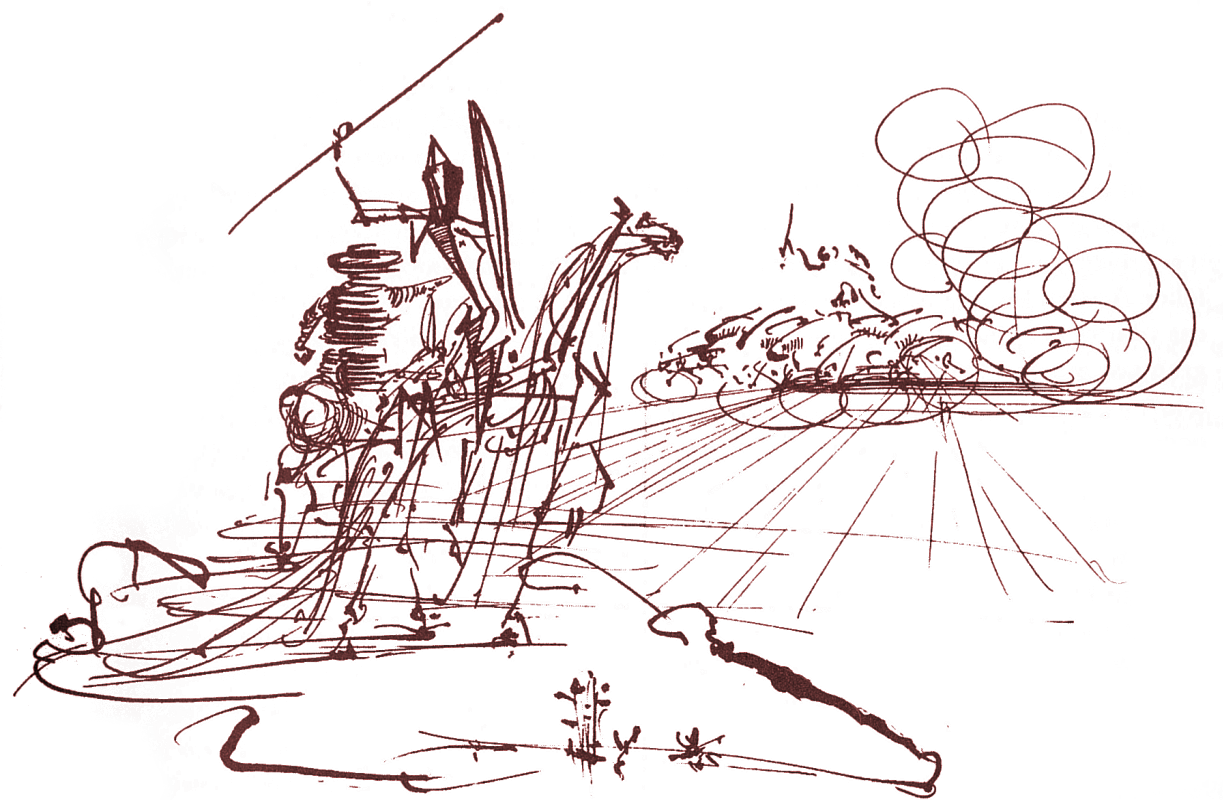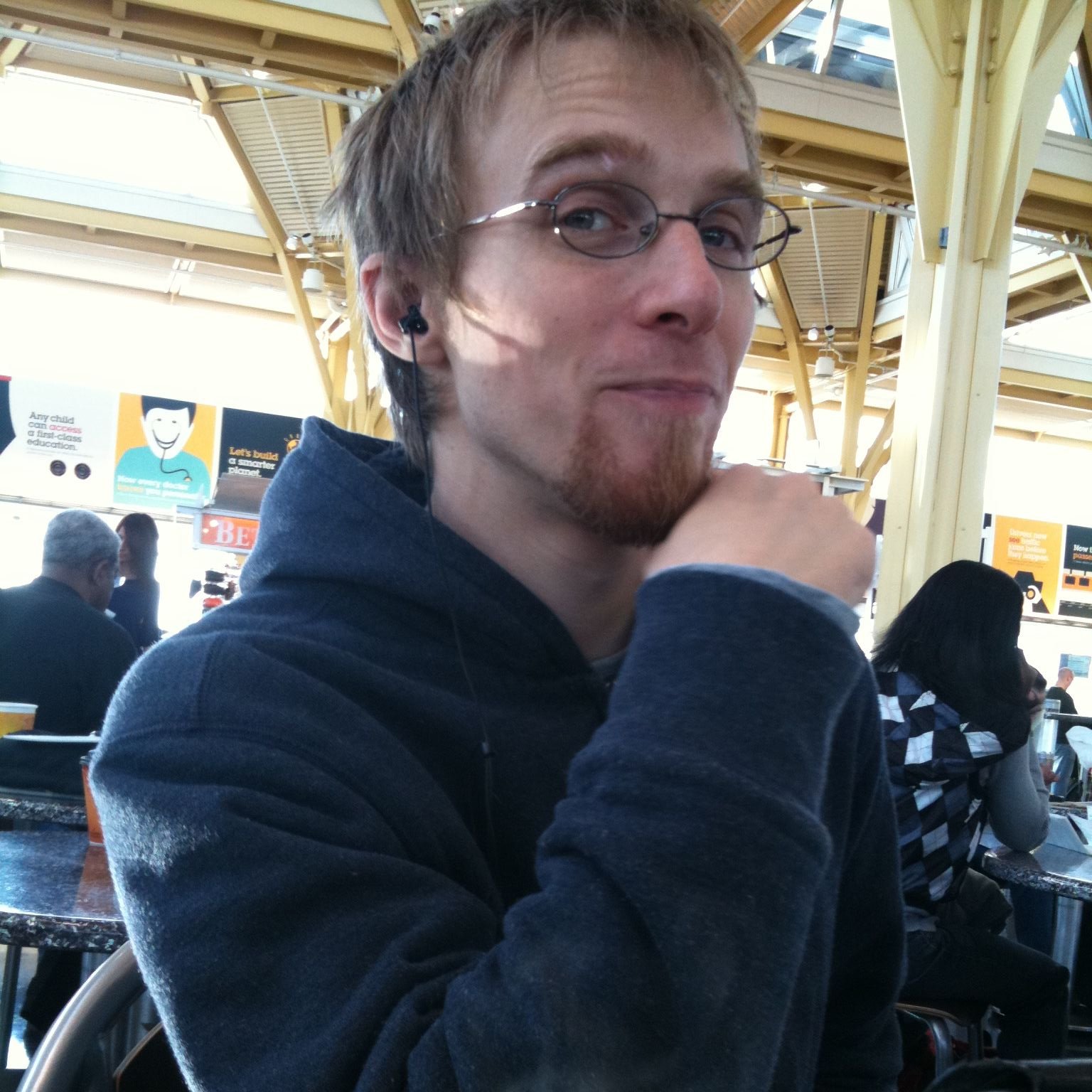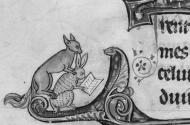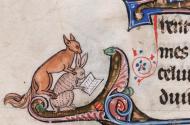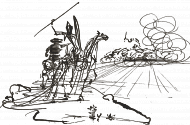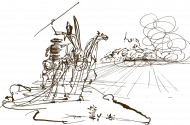I have always believed in magic. Perhaps I believe in magic because I would be bored by a world limned by quadratic equations. But more than that, I don't think we'll ever be able to map the complexities that arise from the simplest of rules. There will always be room for the mystery that has propelled humanity since the inception of language.
In college, I wrote a program to describe the behavior of ants. When they found food, they laid down "pheromones" as they carried it back to the hive. Other ants would follow the pheromone trail to the food, laying down more pheromones. Based on these rules, I expected my ants to behave like flesh-drugged zombies. But what boggled my mind was when the ants appeared excited by the pheromone trail. Behavior emerged from this incredibly simple system that I couldn't explain, even though I'd coded it. I was ignorant to the complexities arising from even the simplest of rules. How much more ignorant are we in understanding the infinite complexity emerging from the human mind? Or complexities emerging from human language?
I also spent time in college with logic proofs, assigning truth values to statements and learning the rules of set theory. But what most interested me were the failures of logic, for instance, in Goëdel Incompleteness Theorum and the subsequent failures to ground number theory in set theory. These paradoxes teach us the limits of formal systems that we can understand. I learned that there is room for both magic and science in the world, and don't ever let anyone tell you differently.
Language is like these ants and these paradoxes. Language is poetry that suggests complex connections that overflow the banks of meaning and fertilize new life. Language can be only partially described by dictionaries or any other systems because the usages of words change and expand in each cultural context. This, to me, is a form of magic. It's as though language itself were something biological that resisted the formalization that would turn it into a mechanism.
But yet, we try. Formal systems like literalism-fundamentalism make Scripture into a function-machine that eats people in order to figure out whether or not they're saved. They tell us about our salvation before we've lived our lives, despite the textual admonitions against assuming that calling Jesus "Lord" means you are saved.
When we ground the entire project of Biblical interpretation in a frame that's too small, we don't allow the Holy Spirit to move through the text and change us. We idolize a specific interpretation of the written word.
God, magic, and poetry are dangerous because they are unpredictable and therefore free to do things that may conflict with our human sense of justice. But our lodestar is love, and doing justice proceeds from love. God's nature is love, and when our healing magic and our poetry proceed from God, we act in love and do not conflict with human justice. But were we to prioritize a system of justice or a system of interpretation over love itself (for which Jesus criticizes the Pharisees) we would lose sight of our lodestar, love. This is the frame of Christianity that I present to you.
Don't let anyone, even me, tell you that their system of interpreting a wild and beautiful text is the only one. Even though you can trust my minimalist interpretation, I promise. The Holy Spirit will surprise you and change you even as you retreat into your shell of certainty. History gives the lie to any singular interpretation of Scripture: we've been reading it differently throughout time using the same words, but the words themselves shift under our feet like tectonic plates.
Yet despite this, we insist on asking irrelevant questions of a story that defines truth in a way that we've lost touch with. The pre-literate thinker sees the word as an act, like a dance or a flame. You participate with it.
And so the questions we ask aren't really aren't important to either the author or to us. We ask them to satisfy a formal system of interpretation that was made to control the poetry of the text (fundamentalism) or to make it conform with a rational-scientific worldview (liberalism). The Bible was never intended to be read by young-earth creationists searching for the "science" of Noah's poetic narrative or liberals who insist because water never covered the earth that the story is "myth." When the water "covers the earth" it seems clear to me that the text refers to the earth that the author knew, not the entire globe. We're not listening to what the text tells us is important, we're seeking to fall on one side or the other of a debate that assumes scientific rationalism. And frankly, this was a tired paragraph to write. There's no life in either of these lines of inquiry.
But when in our arrogance we assume that our way of telling a truthful story is God's way, we can't really be faulted (that's why they call them "blind spots"). But these blind spots in our assumptions are precisely the places where we cannot see and instead must listen.
Now, I'm no scholar, but it seems to me that fundamentalism was created to slice the church in half, using the weapons of modernist rationality to create a church excluding those who wanted to explain the Bible's miracles via science. These (liberal) scientific-rationalists had cut the magic from the miracles in the Bible, while fundamentalists responded by cutting the magic from the text. One meaning. Mary was a virgin. The loaves and fishes was a material miracle, not a miracle of sharing. Jesus was resurrected in the flesh and then his body raised to heaven. (And yes, I do believe in the bodily resurrection, something to which the text strenuously attests.)
It's enough of a miracle to me that God gave Noah premonition of the flood without having to believe that the entire earth was covered in water.
Liberal and conservative thought both lock out the magic and poetry in the Bible, because both insist on the same set of questions rather than allowing for meaning arising from a pre-modern mind, a mind which we don't give the freedom to be sufficiently alien.
We have a lot to learn from pre-modern thinking. We learn, implicitly, that truth is an interaction rather than a static thing bound in a book. We learn that the text means different things as told by different people, in different places. And we learn that this in no way diminishes the definiteness of what God calls us to through listening to the text.
I'm a Christian in that I seek to follow the way of Jesus. Faith is walking this path of love.
The real question that the text asks us to ask it is, "How do we follow the God who is love?"
A lot of people are asking the wrong questions of Christianity. And they're questions that the text doesn't really answer. But if you ask me, or the text, how to follow the God of love, then we'll start getting into an area I love deeply. An area with which I've experimented and to which the Bible speaks.
But so long as we're talking about the annoying liberal/conservative divide, we'll never have anything interesting to talk about.
And there's more to this. When we define Christianity in terms of following Christ rather than believing certain well-defined propositions, we get to talk about how love must result in doing justice or it's not actually Christian love. This and more... in my next article in this series on "What is a Christian?"
